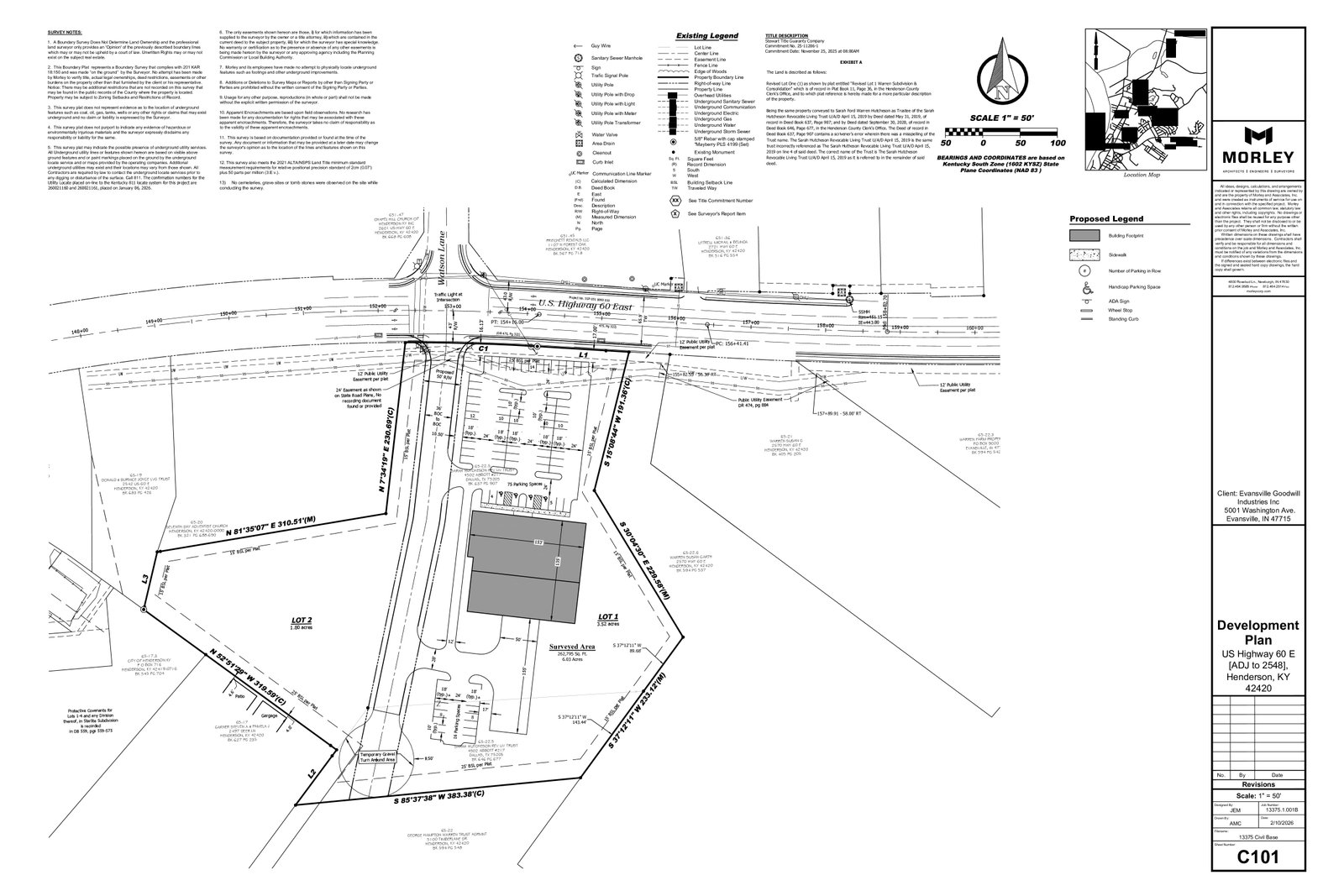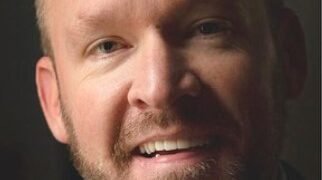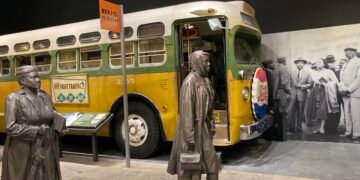The Henderson City-County Planning Commission Tuesday set a preliminary schedule of seven public hearings for the community, experts and Cordelio Energy to provide testimony regarding wind energy conversion systems.
The plan, which includes an initial March 18 meeting and concludes in March 2027, was presented by Brian Bishop, the planning commission executive director, as a way to start the process, which most likely will be complicated and contentious.
The plan calls for meetings to be held on the third Wednesday of every other month and not on the planning commission’s regularly scheduled date and time of the first Tuesday of each month, Bishop said.
He said he didn’t want these meetings to be held at the same time as regular meetings because he didn’t want them to interfere with the more common issues the planning commission deals with, such as rezonings for single parcels and site plans, and he didn’t want planning commissioners to get burned out with long and drawn-out public hearings each month.
Bishop also said, though, that the planning commission has the discretion to change the schedule if it needs to. Planning commission chair, David Dixon, agreed, saying, “Once we get into this, we may decide that we can move quicker, we may decide we need to go slower.”
The tentative schedule, including the area of concern for each meeting, is as follows:
- Noise, vibration and shadow flicker: 6 p.m., Wednesday, March 18, 2026
- Health and annoyance impact review: 6 p.m., Wednesday, May 20, 2026
- Environmental and ecological impacts: 6 p.m., Wednesday, July 15, 2026
- Land use and siting criteria: 6 p.m., Wednesday, Sept. 16, 2026
- Safety, engineering and infrastructure: 6 p.m., Wednesday, Nov. 18, 2026
- Regulatory and administrative framework: 6 p.m., Wednesday, Jan. 20, 2027
- Post draft ordinance public engagement and transparency: 6 p.m., March 17, 2027
At the end of the process, the planning commission intends to develop a draft WECS ordinance with performance standards and siting criteria as well as a summary report that will go to the Henderson County Fiscal Court, according to a document from the planning commission staff.
The plan comes after the fiscal court passed a recent resolution directing the planning commission to do three things. The first was to hold a public hearing and make a recommendation to the fiscal court on a one-year moratorium on all WECS applications that it passed in the summer. The planning commission did that, approving a recommendation for a two-year moratorium which the fiscal court in turn gave final approval of on Oct. 28.
The second directive from the fiscal court is to hold at least one fact-finding public hearing to gather testimony and witness to use to write comprehensive regulations for WECS in the county. Finally, once the regulations have been written in the form of a text amendment to the county’s zoning ordinances, the planning commission is directed to hold a public hearing regarding that draft ordinance.
The planned schedule entails both the second and third directive.
Commissioner Curt Hamilton said the planned schedule seemed long, and interested parties—both the business and the public—would probably want an ordinance more quickly.
Bishop countered that a draft ordinance would be presented in March 2027 which would be much sooner than the length of the fiscal court’s two-year moratorium, which is scheduled to end in October 2027.
Planning Commission Attorney Tommy Joe Fridy said the commission didn’t need to vote on the schedule, which drew some grumbling from the audience, with one audience speaking out that they wanted a vote.
The planning commission agreed that not voting on the schedule allows the body to change the schedule more easily, if needed.
In another matter, Airline Road resident Deirdre McConathy presented a letter from her lawyer in support of her request that the planning commission recommend to the fiscal court a two-year moratorium on battery energy storage systems in Henderson County.
McConathy has been fighting BESS in the county since at least the summer of 2024 when an ordinance for BESS was approved by fiscal court.
McConathy lives near a site in which an energy company wants to build a BESS. Yellowthroat Energy Storage LLC, a subsidiary of Tenaska Energy, submitted rezoning plans for a 35-plus acre parcel on Toy-Anthoston Road with the intention of locating a BESS there in the future. The proposed installation abuts two sides of McConathy’s family farm.
In the letter, Anderson, Ind., attorney Laureen White argued that fiscal court has approved moratoriums for both solar and WECS and the “time has now come for consideration and evaluation of a like moratorium for BESS.”
Additionally, White wrote that a county BESS ordinance, which was passed in August 2024 and based on a similar ordinance passed by the Henderson City Commission, needs to be reevaluated and citizens need to be able to take part in the process. She wrote that citizens weren’t fully aware of BESS when the ordinance was passed, and a moratorium would allow for their concerns to be heard and participate in a revision of the current ordinance.
After the letter was read into the record, Hamilton raised a concern that White was not licensed to practice law in Kentucky. McConathy said White was vouched for by local attorney Dane Shields. Additionally, Fridy said that White would be able to present in planning commission proceedings, but it would be preferred if Shields were to attach a cover letter to further correspondence from White.
The planning commission also:
- Approved a public hearing for the next regularly scheduled meeting in which documents pertaining to wind energy conversion systems can be entered into the public record. This will allow for all the information that up to this point has been disseminated via different methods, including social media, and some documents that have been submitted to planning commission staff to be put into the record, officials said. This is the first public hearing of this kind and meant to collect documents and information that the public and Cordelio has gathered so far, according to several at the meeting. Further information will be allowed to be submitted and discussed by the public, experts and Cordelio at the future public hearings, they said. The next regularly scheduled meeting is set for 6 p.m. on Dec. 2.
Regarding unsupported claims or unsubstantiated science which may be submitted, Dixon said it will be the burden of the planning commission to decipher what can be trusted and used in its decision making.
“All we can do is use our best judgment,” Dixon said.
- Heard a training on communications outside of public meetings given by Fridy. The planning commission attorney said planning commissioners should not engage in any discussion or hear any lobbying regarding the changing of regulations, including involving WECS, outside of planning commission meetings. Commissioners should inform those who try to speak to them that they shouldn’t speak about it, he said. If the conversation continues, the planning commissioner should write a summary of the conversation and submit it at a planning commission meeting to be included in the public record. If a planning commissioner is contacted via email or text regarding regulations, he or she should also submit that information to the planning commission, Fridy said. Fridy said these guidelines are about fairness and are in place so that all sides of an issue can hear the information at a planning commission meeting, when opposition can respond and ultimately when the commission can make its recommendation. Fridy also told planning commissioners that informational documents and studies that are sent to them are subject to discovery in a lawsuit, and it’s the burden of the commissioner to find them if those documents are subpoenaed.




















